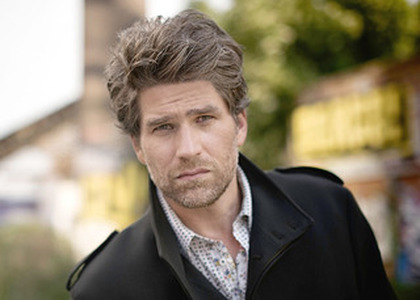> [Archived] Interviews

Interview with violinist Nicolas Dautricourt
This Sunday, March 3rd, the music-loving public is invited to the traditional Mărțișor Concert organized by the SoNoRo Association and Radio România Muzical, marking its fifth edition this year. For this occasion, the French violinist Nicolas Dautricourt, one of the protagonists, spoke with Ioana Țintea.
Mr. Nicolas Dautricourt, how are you looking forward to meeting the audience at the Radio Hall?
First of all, I'm happy to have the opportunity to play in such a beautiful hall, which also boasts a rich history filled with symbolism. On my previous visit to Bucharest, I played in the marvelous hall of the Romanian Athenaeum. Each time I'm invited to perform at SoNoRo events, Răzvan Popovici always takes me to the most beautiful places in Romania. Therefore, I'm very delighted and excited because Bucharest is a great city, and I'm looking forward to returning there.
The recital at the Radio Hall is dedicated to the Mărțisor, a symbol of Spring. For this occasion, you will perform pieces by Grieg and Piazzolla, as well as lesser-known opuses, such as Bohuslav Martinu's "Three Madrigals for Violin and Viola." Joining you on stage will be violist Răzvan Popovici and pianist Shani Diluka. How do you perceive the structure of this program and how would you describe it to us?
Each program we offer is of a multifaceted nature, aiming to showcase the diverse personalities of each performer. We include works by Bruch, which are very romantic and sensitive. The three of us won't always perform on stage together-sometimes it will be just the pianist or a duo performance-so the selected programmust reflect these changes that turn the stage into a living organism, always in motion. Ibelieve the audience will appreciatethis. We will traverse through different eras and styles, featuring both romantic and modern pieces. Even though there will only be three musicians on stage, we aim to make the audience feel like there are hundreds of us!
The event at the Radio Hall also marks the opening of the SoNoRo Conac Tour, now celebrating its 12th edition. What is your view on its significance within the Romanian cultural space?
SoNoRo is an important institution. I think that people in Romania should be very proud to have, of course, the Enescu Festival-a superb event to which I had the honor to be invited. In addition to this, SoNoRo is also an extraordinaryachievement thanks to RăzvanPopovici, who has successfully spread his love for music both in Bucharest and in beautiful places outside the cities. All these achievements are a reflection of his exceptionallygenerous personalityand his openness to new concepts. SoNoRo is a part of Răzvan's life! His goal has been and still is to bring music to big cities as well asvillages. As I've said before, Răzvan is a wonderful man and he created SoNoRo in his own image.
In his interview regarding the Mărțișor Concert at the Radio Hall, conducted with our station, RăzvanPopovici mentioned that you are also a fantastic jazz musician and that we can anticipate some surprises in this direction. Do you typically include jazz pieces in the encores you perform for the audience?
Răzvan is very kind! I'm not sure if I'm good. I simply enjoy the idea of breaking barriers in the musical world, and I think that's amazing. As I've said earlier, a concert is fantastic when you havediversity. It's like a multicultural society with peoplefrom different countries; it's marvelous to have that kind of blend in the world we live in. A concert serves as the manifestation of these multicultural concepts! There is written music, which is strict, but at the same time, there is also improvisation. I enjoy exploring this aspect and try to infuse my programs with diverse soundsevery time. When we invite the audience to our concerts, we're actually taking them on a musical journey encompassing varied styles and a myriad of colors!
Translated by Alina-Gabriela Ariton,
University of Bucharest, Faculty of Foreign Languages and Literatures, MTTLC, year I
Corrected by Silvia Petrescu














